Are dying browsers about to be revived by AI big models?
![]() 07/19 2024
07/19 2024
![]() 498
498
As long as the WEB lives, browsers will thrive.

I believe people are smart, and some are willing to share more data. It's just a matter of asking for their consent, every time. Even if they get tired of it, they should be the ones to tell you to stop asking. And you need to clearly tell them how you will use their data.
In 2010, Apple founder Steve Jobs made the above statement at the D8 conference (D: All Things Digital Conference) hosted by The Wall Street Journal. It was also around 2010 when Apple began researching ways to protect user data.
After more than a decade of development, Apple has established a strong reputation for "privacy and security" among its vast user base.
But at the same time, advertisers' complaints about Apple have become commonplace. From "App Tracking Transparency" on iOS 14.5 to Safari's "Web Eraser" announced at WWDC24 recently, Apple has repeatedly touched a nerve with global advertisers.
After all, as the old saying goes: "To take away someone's livelihood is like killing their parents."
In the latest round of Safari browser upgrades, there's one change that most advertisers may welcome: Apple has introduced a new advertising tracking technology.
Safari users, don't panic yet; this doesn't mean Apple is sacrificing user privacy.
Safari's "Private Browsing 2.0": Can Privacy and Advertising Efficiency Coexist?
On July 16, Apple published an article titled "Private Browsing 2.0" on the WebKit blog (the default browser engine for iOS/iPadOS).
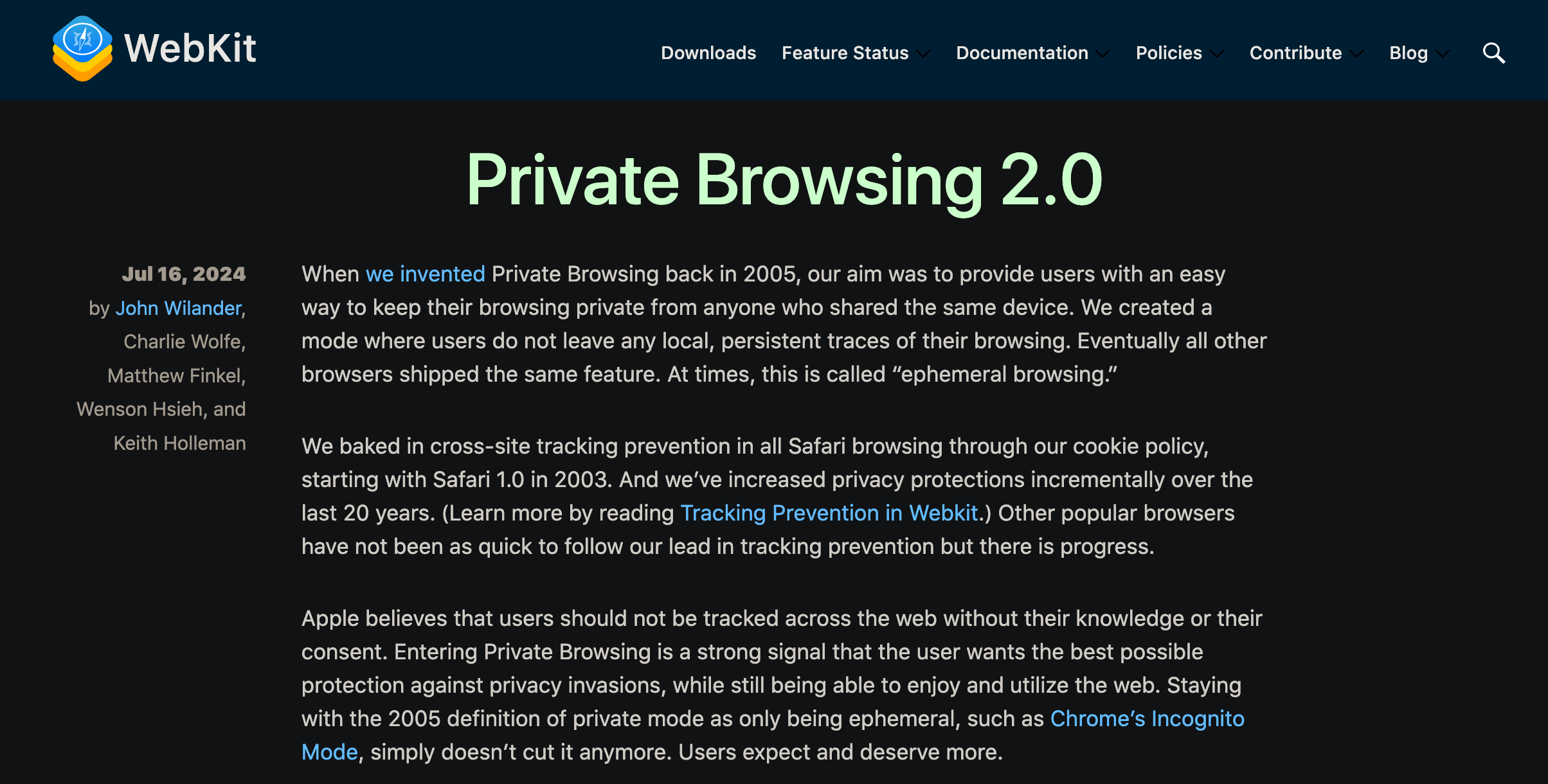
Image/Apple
In addition to Safari's new privacy protection features, Apple's WebKit team highlighted a new advertising tracking technology introduced in Safari: Web AdAttributionKit (formerly PCM, Private Click Measurement), which can also function to a limited extent in Safari's "Private Browsing" mode.
As we all know, in the internet era, "the wool can come from the pig's body," and the "free + advertising" business model has brought about the rapid popularization of the internet. However, as internet companies pursue advertising efficiency (essentially revenue), they have begun to continually sacrifice user privacy. But in the past decade, people have begun to pay more and more attention to their "privacy and security".
Before finding a more universal and user-friendly business model, we still can't do without advertising, but strengthening "privacy protection" is something we can and must do.
According to Apple, Web AdAttributionKit is a way for advertisers, websites, and apps to implement ad attribution and click measurement in a privacy-protective manner. Simply put, it's an advertising tracking solution that replaces URL tracking parameters and cookie tracking.
Apple claims that Web AdAttributionKit can "balance" advertising efficiency while ensuring user privacy and security. Additionally, while there has been some controversy over its use in "Private Browsing" mode, Apple has clarified that Web AdAttributionKit's ad attribution is limited to a single tab.
For example, clicking a link in one tab will continue tracking, but cross-tab ad attribution will not occur. Similarly, copying and pasting the link into a new tab will not result in ad attribution.
In web browsing, websites typically track users primarily through "tracking parameters" in URL suffixes and cookies that carry user or device IDs. However, these two methods have fallen behind modern web demands, especially in terms of privacy and security.
For example, many browsers such as Safari, Firefox, Brave, and Arc have already blocked URL tracking parameters by default. At the same time, companies are exploring and trying out new solutions to replace cookies, such as Google's abandoned FLoC and the later introduced Topics API.

Parameters after the bv number can track users, Image/GitHub
I won't delve into the specific content of these solutions and related controversies here, but regardless, they are all attempts by browser vendors in an era where "user privacy" is increasingly valued.
Meanwhile, not only Apple's Safari but also web browsers, this "ancient" internet product that emerged alongside the World Wide Web (WWW or Web), have continued to progress and even evolve in recent years.
The Self-Innovation of Browsers: From Privacy Protection to Generative AI
In May 2015, Brendan Eich, the former CTO of Mozilla (which owns Firefox), founded a company called Brave Software, and in January of the following year, it launched the first version of the Brave browser, which focused on "privacy and security".
Although Brave has faced some controversy and criticism at both the company and product levels, today, Brave has established a leading reputation for "privacy and security" among browser core user groups, even surpassing the non-profit Firefox.
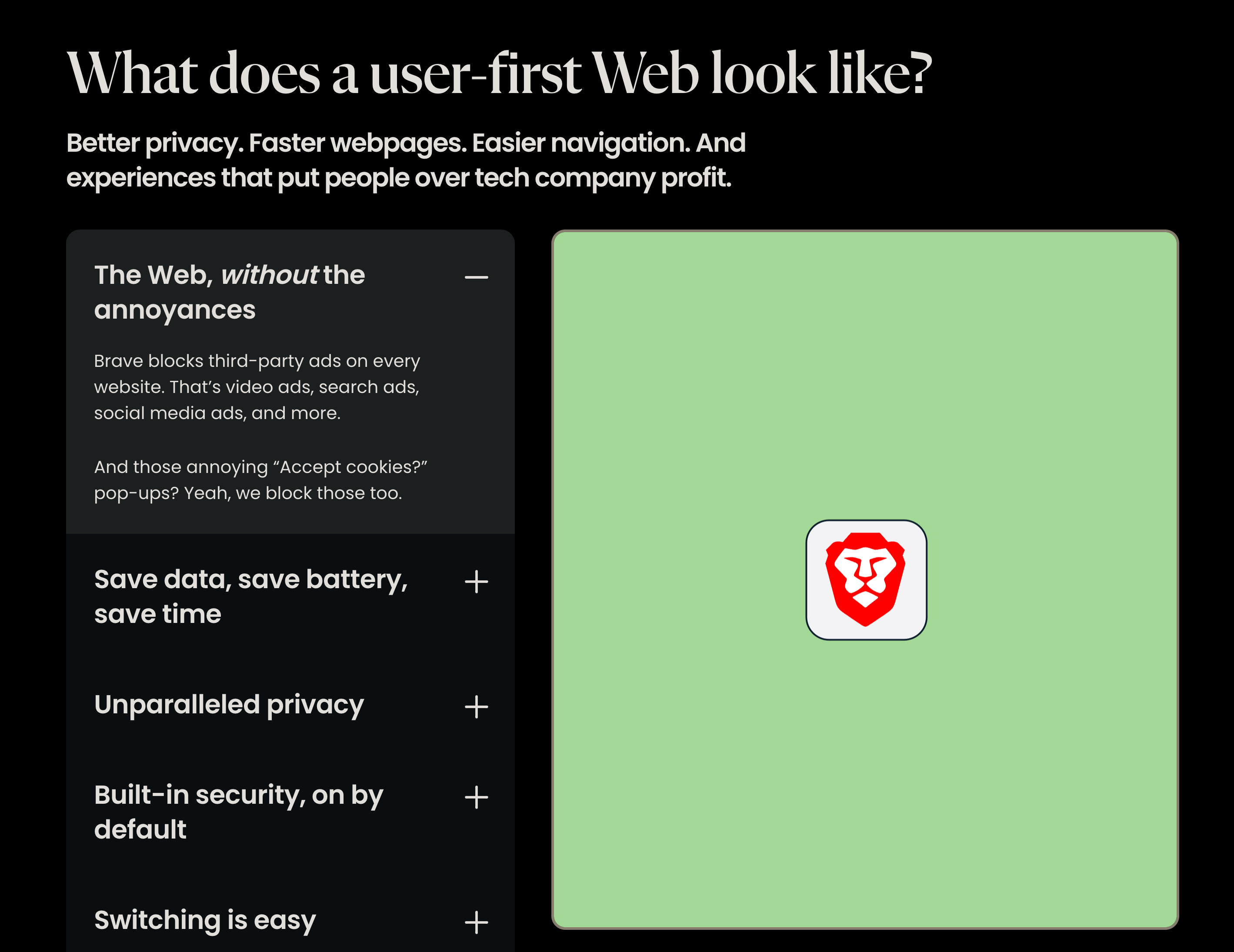
Brave's official website, Image/Brave
Not only Brave, which was born with a focus on "privacy." Over the past decade, the internet has faced growing conflicts between advertisers and product users. Advertisers encourage the collection and storage of more detailed and private personal information from internet users to provide more effective ads, but more and more users resent the collection of their personal information.
Browser vendors have also perceived these changes, and from startups like Vivaldi and Arc to tech giants like Chrome and Edge, all have been conveying and following up on privacy protection technologies and strategies.
Undoubtedly, privacy protection has been a main theme in browser development over the past decade, perhaps even the most important one. But aside from that, while browsers' importance as "gateways" has been significantly diminished in the mobile internet era, they have continued to improve performance and explore more application scenarios and possibilities, such as the development of WebXR and other technologies.
In addition, browser vendors around the world are also exploring the "endgame" of browsers in different ways.
For a long time, domestic browsers have focused their efforts on mobile devices, constantly cramming in various news feeds and short video streams, starting with the "UC Shock Department." At the same time, browsers usually integrate various functions, such as novel reading, document scanning, cloud storage, and even games, offering a "one-pot stew" experience.
But there are also "outliers." When Quark was first incubated from the UC team, it simply returned to the essence of browsers—web browsing, without cluttered information streams or functions unrelated to web browsing. Even Quark's homepage design has influenced the "clean design" mode of most domestic browsers.
Although Quark has become more complicated with changes and updates to its product positioning, it has not directly bombarded users with a pile of "information garbage."
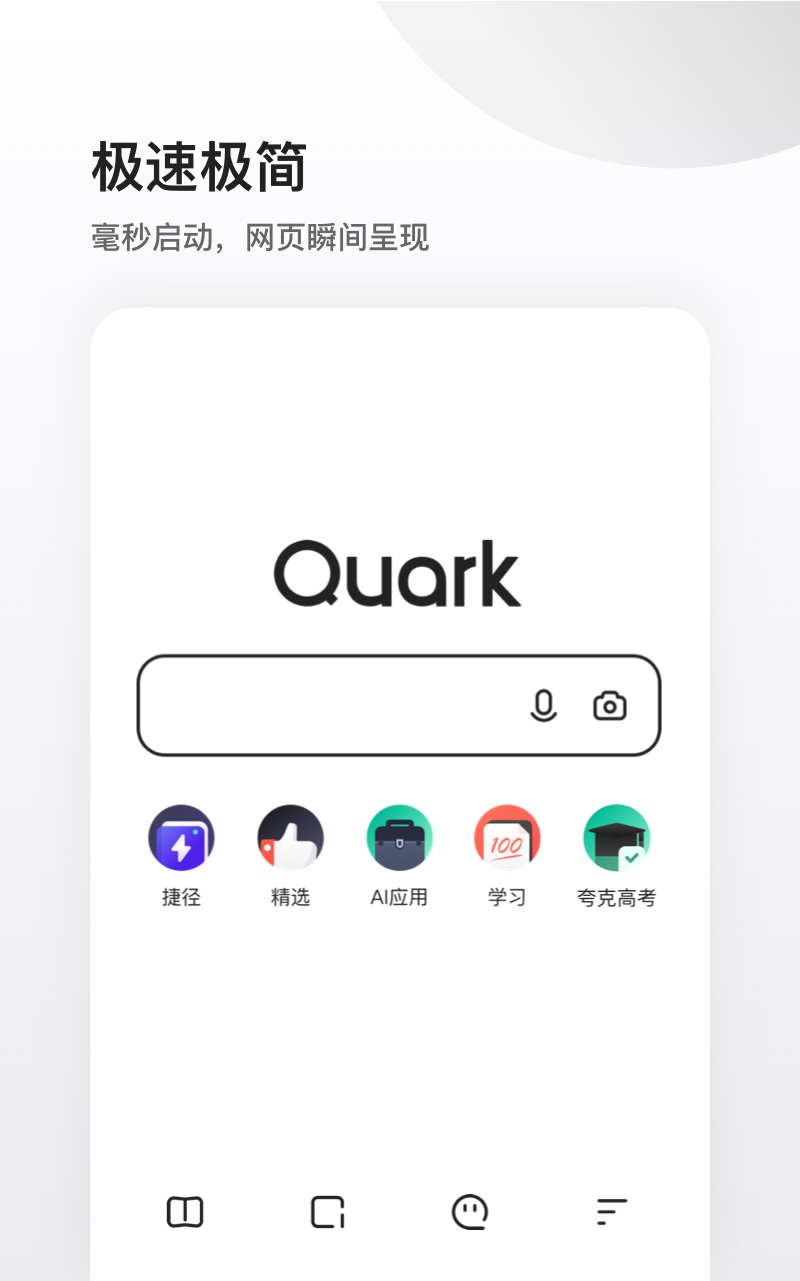
Quark's homepage, Image/Quark
The changes in Quark are also changes in browsers.
As an early Quark user, Xiao Lei remembers when Quark's functions continued to increase and its installation package size continued to grow, it was criticized by many long-time users for "losing its original intention." However, the Quark team once explained the reason, roughly meaning that staying the same wouldn't work. A pure browser couldn't attract or retain users in the app era and couldn't survive in the domestic market.
In contrast, mainstream browsers overseas are generally more "sleek," advocating simpler designs and not having too many functions beyond "web browsing." Even though Chrome added a news feed to its homepage a few years ago, its relatively high-quality third-party content (whether in Chinese or English) and relatively fewer ads make it more like an article recommendation system compared to RSS.
But at the same time, not only Quark is thinking about how to redesign browsers; a host of overseas startups are also thinking about it, with the difference perhaps being that overseas startups focus more on PCs.
Compared to Brave's emphasis on privacy and new browser business models, Vivaldi, developed by founders Tan Yongwen and Tomohiro Futada after leaving Opera, shares some similarities with Quark to some extent.
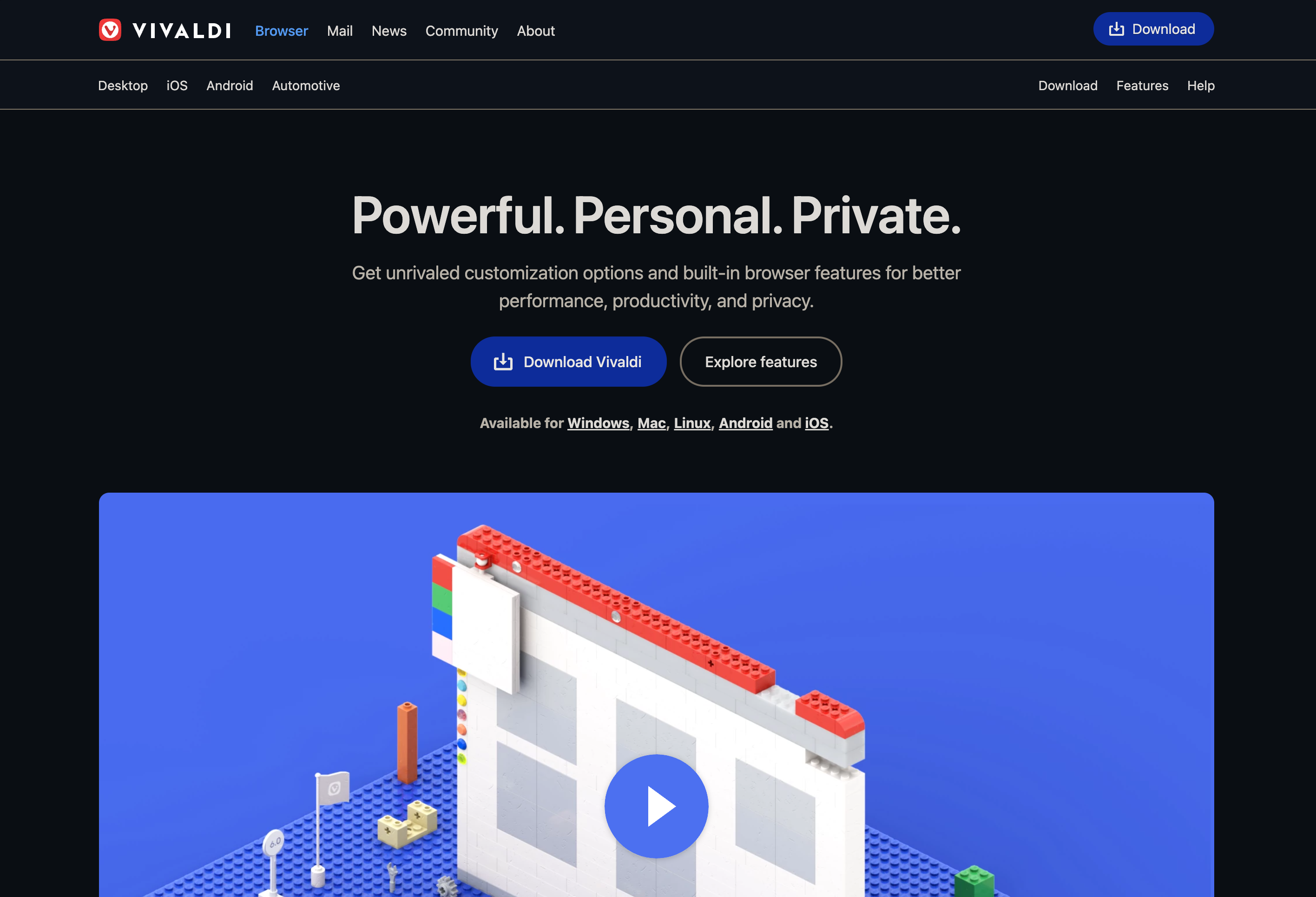
Image/Vivaldi
In addition to adding local-based email management, notes, screenshots, and other functions to the browser, Vivaldi has also improved the browser's bookmark system, combining bookmarks with "speed dials" (similar to shortcuts on the browser homepage), as well as introducing parallel browsing (two webpages in one window) and a host of other detailed changes.
Moreover, changes have emerged in overseas mobile browsers by introducing desktop plugin systems. From initially being "custom browsers" only available to individual developers and small companies, Safari and Firefox have now officially supported plugins on mobile devices.
But in Xiao Lei's opinion, the most surprising product in the browser space over the past two years has been Arc.
Frankly, many of Arc's designs can be found in other browsers or plugins, such as Vivaldi's parallel browsing, vertical tabs, and partitioning systems. Of course, Arc also has previously unseen or unknown designs, such as not having a homepage, defining bookmarks as "pinned tabs," and opening independent windows when opened from third-party software.
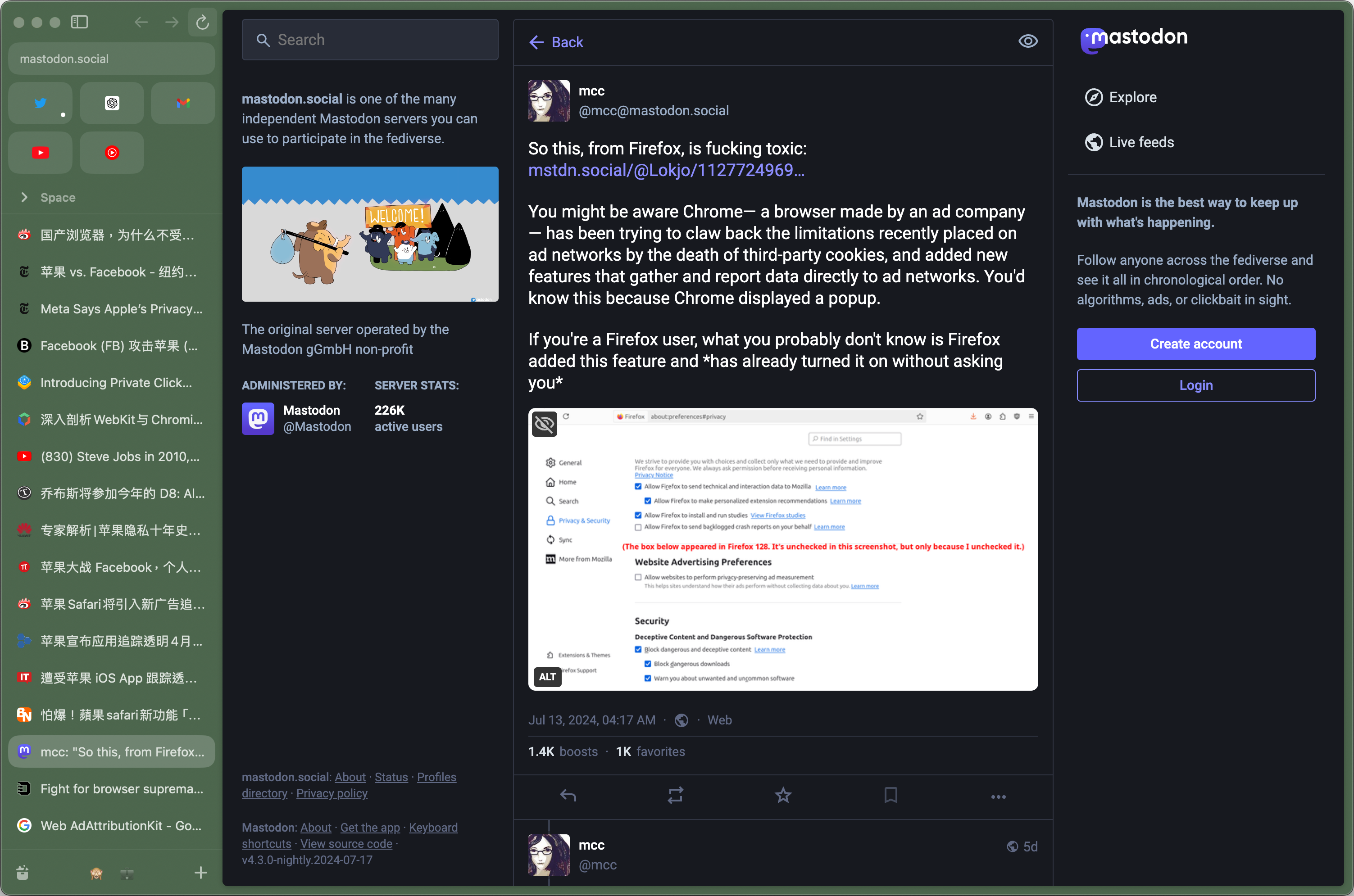
Arc, Image/Leitech
However, as a user who has been switching between Firefox and Chromium-based browsers for years, Xiao Lei genuinely believes that under Arc's holistic design, the aforementioned designs appear more reasonable and comfortable.
And the arrival of ChatGPT, while somewhat disrupting Arc's original plans, actually sparked an even more thorough browser innovation, from Arc to Quark.
AI + Browsers: The Ultimate Form of Browsing the Web World?
Today, every browser is incorporating generative AI features. Among mainstream browsers, Microsoft Edge was probably the first, while Chrome seemed relatively sluggish, not introducing generative AI until earlier this year. Most mainstream browsers have started introducing generative AI somewhere between Edge and Chrome.
The common approach on the desktop is to add AI chatbots to the sidebar, offering features such as webpage summaries, Q&A based on webpage content, rewriting, and writing assistance, like Edge and Chrome.
The standard answer on mobile is AI search, with browsers like 360 AI Browser and Quark defaulting to AI search to simplify the process of finding information on mobile devices.
Meanwhile, represented by 360 AI Browser and Quark, domestic AI browsers tend to incorporate more functions to cover more usage scenarios, such as summarizing long documents, summarizing videos, AI-generated articles, and even courseware.
But based on Xiao Lei's limited experience and knowledge, the browser that generative AI has changed the most may still be Arc. In addition to completely redesigning its mobile version, five months ago, The Browser Company announced the "second act" of the Arc browser, which belongs to AI.
On Arc's desktop version, generative AI doesn't have a sidebar but will "pre-summarize" webpage content behind links on search results pages. It can also answer related questions at any time on content pages and let AI directly open the article links you need in the search box (Instant Links), bypassing the search interface.
For example, if you want to read a review of the Xiaomi 14 Ultra, you can simply type "Xiaomi 14 Ultra review," press shift+enter, and AI will automatically find and open the relevant review article.
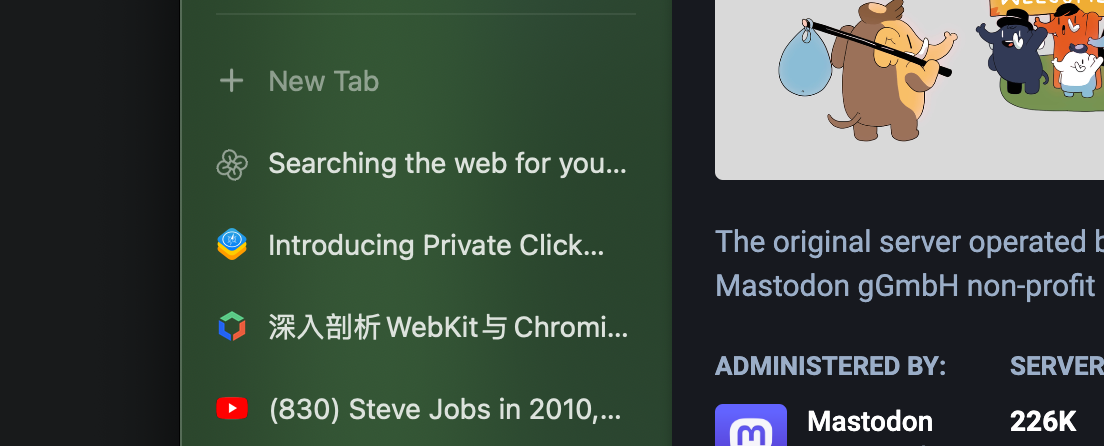
Instant Links feature, Image/Leitech
On mobile, the relaunched Arc Search made significant changes, essentially focusing on search, with no homepage design and basic tab functionality. Arc Search combines traditional search with AI search ("Browser for Me"), with AI only fulfilling users' "questions and answers," and traditional search methods serving as a fallback.
In terms of product positioning, Arc Search is primarily a "use and go" companion app for Arc Browser.
Browsers Won't Die, But They Will Change
As long as the Web lives, browsers will never die. But user needs are changing, and technology is evolving, so the evolution of browsers is inevitable.
Perhaps, there's still no certainty about what future browsers will become. Domestic and overseas browsers are all engaged in similar or different explorations. Ultimately, not just browsers but most of us and manufacturers need a process of adaptation and learning when it comes to AI applications.
But it's basically certain that privacy and AI will be the two main themes of browsers in the future. The former will make users feel more at ease online, while the latter will make it easier for users to obtain the information they need from large models and the internet in this era of overwhelming information.
Source: Leitech




